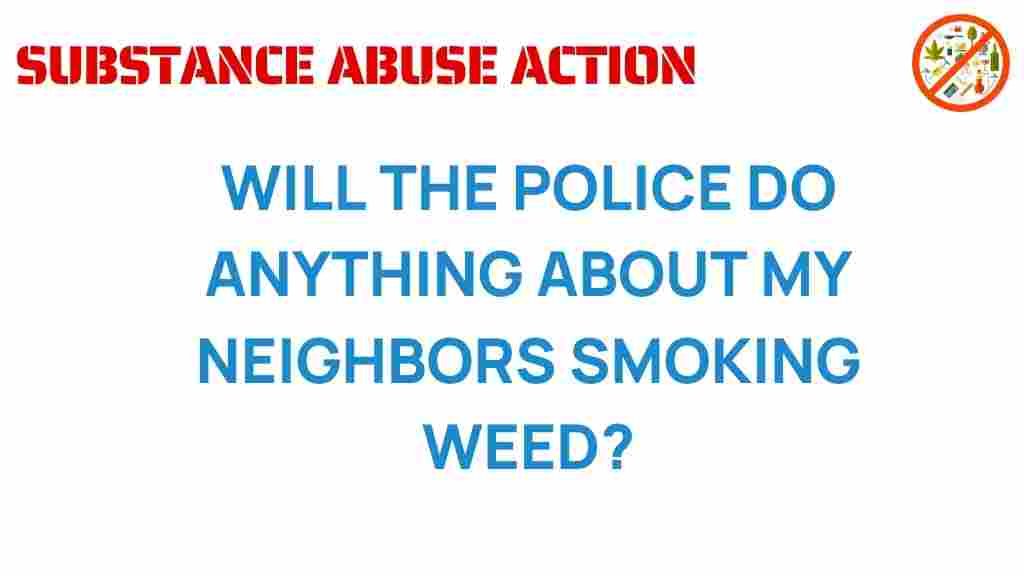The Legal Gray Area: What Can You Do About Neighbor’s Weed Smoke?
As marijuana laws evolve across the United States, many neighborhoods are grappling with the implications of cannabis consumption, especially regarding secondhand smoke. With the increasing acceptance of marijuana, disputes over cannabis smoke have become more common, leading to a need for clarity on your legal rights and community concerns. This article will explore the complexities of neighbor’s weed smoke, including police response, legal rights, and public health implications.
Understanding Marijuana Laws
The legality of cannabis use varies widely from state to state. Understanding local marijuana laws is crucial for addressing disputes over cannabis smoke. Here are some key points to consider:
- Legal Status: In some states, marijuana is fully legal for both medical and recreational use, while others allow only medical use or have not legalized it at all.
- Home Use Regulations: Even in states where marijuana is legal, there may be regulations governing its use in private residences, especially in multi-family dwellings.
- Smoking Regulations: Many jurisdictions have specific smoking regulations that may include restrictions on where residents can smoke cannabis.
Being aware of these laws can help you assess your situation better and determine the best action to take regarding your neighbor’s cannabis smoke.
The Impact of Cannabis Smoke on Public Health
Concerns about cannabis smoke often relate to its potential health effects on non-smokers, especially children and individuals with respiratory issues. Research has shown that secondhand smoke from marijuana can contain harmful substances similar to those found in tobacco smoke. Here are critical points regarding public health:
- Health Risks: Exposure to cannabis smoke may exacerbate respiratory problems and allergies.
- Vulnerability: Individuals with pre-existing health conditions, children, and pregnant women may be particularly vulnerable to the effects of secondhand smoke.
- Community Concerns: Beyond health implications, there are often community concerns regarding the normalization of smoking and its visibility in residential areas.
Neighborhood Disputes: When to Seek Help
Neighborhood disputes related to cannabis smoke can escalate if not addressed properly. Here’s a step-by-step approach to resolving these issues:
Step 1: Assess the Situation
Before taking any action, assess the severity of the issue. Consider the following:
- How often does the smoke affect your home?
- Are there particular times when the smoke is more prominent?
- Have you spoken to your neighbor about the issue before?
Step 2: Communicate with Your Neighbor
Open communication can often resolve disputes without escalating the situation. When approaching your neighbor:
- Be respectful and non-confrontational.
- Explain how the smoke is affecting you or your family.
- Listen to their perspective and see if a compromise can be reached.
Step 3: Document the Incidents
If the problem persists, it is essential to document the incidents. Keep a record of:
- Date and time of each occurrence.
- The duration and intensity of the smoke.
- Any health effects experienced by you or your family.
Step 4: Review Local Smoking Regulations
Familiarize yourself with local smoking regulations that might apply to cannabis use. If your neighborhood has specific smoking bans, this information can be crucial in your case.
Step 5: Involve Law Enforcement if Necessary
If you have made reasonable attempts to resolve the issue and your neighbor is uncooperative, you may consider contacting law enforcement:
- Contact your local police department to inquire about their policies on cannabis smoke complaints.
- Provide them with your documented incidents to support your case.
- Remember, the police response will vary based on local laws and regulations related to cannabis.
Legal Rights and Responsibilities
Understanding your legal rights is essential when dealing with neighborhood disputes. Here are some key points:
- Right to Clean Air: Many jurisdictions recognize a resident’s right to clean air, which may include protection from secondhand cannabis smoke.
- Property Rights: If cannabis smoke is affecting your property or enjoyment of your home, you may have legal recourse.
- Mediation Services: Many communities offer mediation services for neighborhood disputes, which can be a non-confrontational way to address issues.
Troubleshooting Tips for Ongoing Issues
If you continue to experience issues with your neighbor’s cannabis smoke, consider these troubleshooting tips:
- Air Purifiers: Invest in high-quality air purifiers that can filter out smoke particles.
- Seal Windows: Ensure your windows and doors are properly sealed to minimize smoke intrusion.
- Talk to Other Neighbors: If others are also affected, consider approaching the situation as a group for a stronger case.
Conclusion
Navigating the legal gray area surrounding neighbor’s weed smoke can be challenging, especially as marijuana laws continue to evolve. Understanding your legal rights, the impact of cannabis smoke on public health, and the proper channels for addressing neighborhood disputes is crucial. While communication is often the first step in resolving such issues, being prepared to involve law enforcement or seek legal advice may be necessary if the situation does not improve.
For further reading on cannabis laws and community concerns, you can check this resource.
Ultimately, fostering a respectful and open dialogue within your community can lead to healthier and more harmonious living environments for everyone.
This article is in the category Support and created by SubstanceAbuseAction Team
